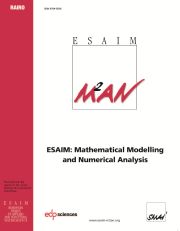Article contents
Second-order MUSCL schemes based on Dual Mesh Gradient Reconstruction (DMGR)
Published online by Cambridge University Press: 20 January 2014
Abstract
We discuss new MUSCL reconstructions to approximate the solutions of hyperbolic systems of conservations laws on 2D unstructured meshes. To address such an issue, we write two MUSCL schemes on two overlapping meshes. A gradient reconstruction procedure is next defined by involving both approximations coming from each MUSCL scheme. This process increases the number of numerical unknowns, but it allows to reconstruct very accurate gradients. Moreover a particular attention is paid on the limitation procedure to enforce the required robustness property. Indeed, the invariant region is usually preserved at the expense of a more restrictive CFL condition. Here, we try to optimize this condition in order to reduce the computational cost.
- Type
- Research Article
- Information
- ESAIM: Mathematical Modelling and Numerical Analysis , Volume 48 , Issue 2: Multiscale problems and techniques , March 2014 , pp. 583 - 602
- Copyright
- © EDP Sciences, SMAI, 2014
References
- 9
- Cited by


